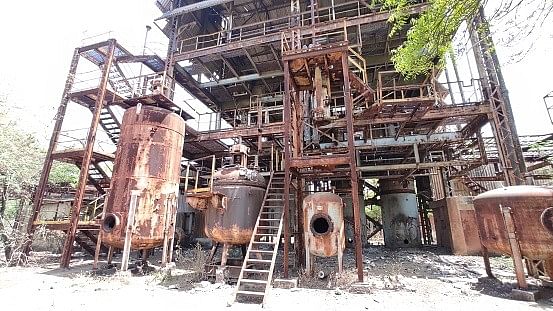
Representative image of the abandoned industrial site where gas leakage took place in Bhopal.
Credit: iStock Photo
Bhopal: The toxic gas leak from the now-defunct Union Carbide factory on the chilly night of December 2 not only killed thousands of people in Bhopal but continues to give nightmares to the survivors 39 years since the tragedy.
At least 3,787 people were killed and more than five lakh were affected physically after a toxic gas leaked from the pesticide factory on the intervening night of December 2 and 3, 1984.
"I shudder in fear and tremble on December 2 nights. I saw people collapsing dead on that chilly night," Mahendrajeet Singh (79), a gas victim and retired chief reservation superintendent of railways, told PTI on Saturday.
Recalling the fateful night, Singh said, "My family was asleep around 2 am when shouts and cries of people in the railway colony some distance from the Union Carbide factory woke us up. We ran out of the house and fled on a scooter and on foot to escape the gas emanating from the killer factory." His family spent the night at a hotel 4 km from their house, said Singh, the president of All India Retired Railwaymen Federation Western Zone.
Some years later, Singh lost his mother and younger brother who were exposed to toxic gas.
"Three days after the gas leak, I noticed the leaves of a peepal tree near our house had fallen and it appeared dead and lifeless," he said, adding that the effect of the toxic gas on trees and plants was noticed in other parts of the city as well.
"After the tragedy, there were rumours that the remaining toxic gas would be released from the factory. In light of such unconfirmed reports, we sought refuge in the neighbouring Hoshangabad district," Singh said.
The former railwayman said he had lost several of his colleagues in the tragedy and those who survived, were living with ailments, especially breathing problems.
Rambali Prasad Verma (83), a retired assistant station master, said he was lucky to survive the disaster.
"My duty at the railway cabin located close to the boundary wall of the Union Carbide factory ended at 10 pm on the night of December 2," he recounted.
Around midnight, when the gas leaked from the factory, Verma was at his house in the railway colony near the railway station.
"We ran helter-skelter to escape the poisonous gas and found refuge in an Army vehicle at a far-off place," he said.
Verma and his family returned home at daybreak, but again left their home a few hours later as there were rumours that the remaining toxic gas would be released around 11 am on December 3.
After some days, Verma's family went to Indore and returned when things settled down.
"When I think of that chilly night, I start shivering. I have breathing problems and asthma as I was exposed to the gas," the octogenarian said.